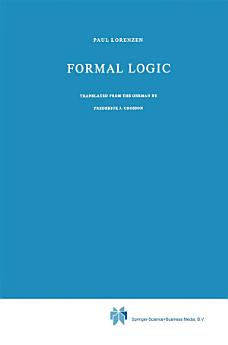Formal Logic
P. Lorenzen
ມ.ນ. 2013 · Synthese Library ຫົວທີ 9 · Springer Science & Business Media
4,0star
2 ຄຳຕິຊົມreport
ປຶ້ມອີບຸກ
123
ໜ້າ
reportບໍ່ໄດ້ຢັ້ງຢືນການຈັດອັນດັບ ແລະ ຄຳຕິຊົມ ສຶກສາເພີ່ມເຕີມ
ກ່ຽວກັບປຶ້ມ e-book ນີ້
"Logic", one of the central words in Western intellectual history, compre hends in its meaning such diverse things as the Aristotelian syllogistic, the scholastic art of disputation, the transcendental logic of the Kantian critique, the dialectical logic of Hegel, and the mathematical logic of the Principia Mathematica of Whitehead and Russell. The term "Formal Logic", following Kant is generally used to distinguish formal logical reasonings, precisely as formal, from the remaining universal truths based on reason. (Cf. SCHOLZ, 1931). A text-book example of a formal-logical inference which from "Some men are philosophers" and "All philosophers are wise" concludes that "Some men are wise" is called formal, because the validity of this inference depends only on the form ofthe given sentences -in particular it does not depend on the truth or falsity of these sentences. (On the dependence of logic on natural language, English, for example, compare Section 1 and 8). The form of a sentence like "Some men are philosophers", is that which remains preserved when the given predicates, here "men" and "philosophers" are replaced by arbitrary ones. The form itself can thus be represented by replacing the given predicates by variables. Variables are signs devoid of meaning, which may serve merely to indicate the place where meaningful constants (here the predicates) are to be inserted. As variables we shall use - as did Aristotle - letters, say P, Q and R, as variables for predicates.
ການຈັດອັນດັບ ແລະ ຄຳຕິຊົມ
4,0
2 ຄຳຕິຊົມ
ໃຫ້ຄະແນນ e-book ນີ້
ບອກພວກເຮົາວ່າທ່ານຄິດແນວໃດ.
ອ່ານຂໍ້ມູນຂ່າວສານ
ສະມາດໂຟນ ແລະ ແທັບເລັດ
ຕິດຕັ້ງ ແອັບ Google Play Books ສຳລັບ Android ແລະ iPad/iPhone. ມັນຊິ້ງຂໍ້ມູນໂດຍອັດຕະໂນມັດກັບບັນຊີຂອງທ່ານ ແລະ ອະນຸຍາດໃຫ້ທ່ານອ່ານທາງອອນລາຍ ຫຼື ແບບອອບລາຍໄດ້ ບໍ່ວ່າທ່ານຈະຢູ່ໃສ.
ແລັບທັອບ ແລະ ຄອມພິວເຕີ
ທ່ານສາມາດຟັງປຶ້ມສຽງທີ່ຊື້ໃນ Google Play ໂດຍໃຊ້ໂປຣແກຣມທ່ອງເວັບຂອງຄອມພິວເຕີຂອງທ່ານໄດ້.
eReaders ແລະອຸປະກອນອື່ນໆ
ເພື່ອອ່ານໃນອຸປະກອນ e-ink ເຊັ່ນ: Kobo eReader, ທ່ານຈຳເປັນຕ້ອງດາວໂຫຼດໄຟລ໌ ແລະ ໂອນຍ້າຍມັນໄປໃສ່ອຸປະກອນຂອງທ່ານກ່ອນ. ປະຕິບັດຕາມຄຳແນະນຳລະອຽດຂອງ ສູນຊ່ວຍເຫຼືອ ເພື່ອໂອນຍ້າຍໄຟລ໌ໄໃສ່ eReader ທີ່ຮອງຮັບ.







